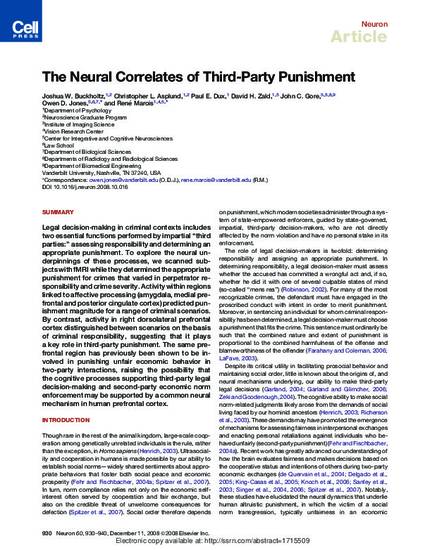
- punishment; neuroscience; judging; decision-making; sentencing; law and neuroscience; brain imaging; behavioral biology; cognitive psychology
This article reports the discovery, from the first full-scale law and neuroscience experiment, of the brain activity underlying punishment decisions.
We used functional magnetic resonance imaging (fMRI) to measure brain activity of subjects as they read hypothetical scenarios about harm-causing protagonists and then decided whether to punish and, if so, how much.
The key variables were: a) presence or absence of excusing, justifying, or otherwise mitigating factors (such as acting under duress); and b) harm severity (which ranged from a stolen CD to a rape/murder/torture combination).
Findings include:
(1) Analytic and emotional brain circuitries are jointly involved, yet quite separately deployed, during punishment decisions. Specifically:
(a) Analytic circuitry of the brain - centered on the right dorsolateral prefrontal cortex - tracks how responsible a protagonist is for harmful behavior (but does not determine punishment levels across varying harms);
(b) Conversely, activity in brain circuitry important for experiencing emotion - the amygdala, for example - predicts punishment levels across the range of crime severity (but is uncorrelated with responsibility levels).
(2) Increased activity in a component of the so-called Theory of Mind (perspective-taking) network (the temporo-parietal junction) preceded increased activity in the analytic region, during responsibility assessments.
(3) The analytic region deployed in distinguishing between high and low responsibility for harmful behavior in third-party contexts is the same region that is most involved in punishing unfair economic behavior in two-party interactions.
Available at: http://works.bepress.com/owen-jones/28/
